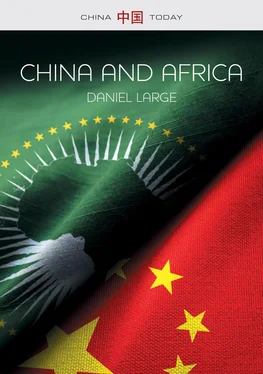This book thus explores the interplay between political, economic and social dynamics in relations. As well as offering a deeper and broader framework, this general political economy approach helps overcome a number of problems. For instance, available data, including the accuracy of economic statistics from Chinese, African and other sources, is problematic. Even where data exist, traditional statistics like trade don’t capture global value chains well. Another problem is over reliance on official Chinese foreign-policy principles. Because these are constitutive of relations, they cannot be either taken at face value or dismissed as pure hypocrisy. Much like the architect of China’s economic reforms from 1978 Deng Xiaoping’s emphasis on seeking ‘truth from facts’, examining the empirical substance of relations – what is, not what is supposed to be – enables analysis to go beyond that based on official rhetoric.
A fundamental challenge in studying China–Africa relations is the abstraction inherent in ideas about and uses of ‘China’ and ‘Africa’. With an official population of some 1.4bn in 2019, China is a continental-sized country with 23 provinces, five autonomous regions (including Xinjiang), four municipalities, and two special administrative regions (Hong Kong and Macau). The complexity of ‘China’ must be always borne in mind. It also needs to be disaggregated. Although there are multiple Chinas, China has a dominant political centre controlled by the CCP party-state-military. ‘Africa’ can mean many things, including a place, an idea, a project, a centre or a periphery. Obviously, there are thus multiple Africas, including regions, diverse politics and economies, and some 2,140 living languages. In political terms alone, the African Union (AU) has 55 member states divided into five geographic regions. 19This means a huge variation in the political map of the continent – and China’s official interlocutors – featuring all manner of regime types, from established democracies to authoritarian regimes or conflict-afflicted states.
The 53 highly diverse African states with which China maintains diplomatic relations can be grouped into three general categories: first, states like Botswana, Benin, Ghana, Senegal, Mauritius or South Africa that have established, open and competitive democracies, even while many remain institutionally weak. A second group includes such different cases as Kenya, Uganda, Burundi, DRC or Zimbabwe, ruled by leaders with authoritarian tendencies but in contexts where there are popular opposition parties. Third, there are authoritarian governments with strong control but no qualms about holding elections, such as Cameroon, Chad or Rwanda. 20China, by contrast, is governed by an authoritarian party-state-military system. With over 91.91m members at the end of 2019, CCP membership alone is larger than the populations of all but three African countries: Nigeria, Ethiopia and Egypt. The contrast between China’s authoritarian capitalist party-state and diverse political systems in Africa is one starting point for putting relations into broad context. It also helps bring out the need to go beyond a state focus in Africa–China relations by including the diverse range of participants, such as the active role of different civil society groups or independent media in many countries in the continent.
Many books warn against generalization and then generalize; this book is no different but does not go beyond the ways in which Africa is, in its terms, part of China’s foreign policy. 21Africa may be an abstraction but is one that remains necessary to use. The main reason why both China and Africa need to be used, on top of or along with defined African countries, is because the CCP, Chinese state, corporations and others frame and approach relations in these very terms. Africa has meaning as a category in China’s foreign policy, as FOCAC shows. However, China’s relations with 53 individual African countries mean relations have a strong bilateral character. Likewise, China’s Africa policy has a continental policy framework in theory, and 53 (or 54, if Taiwan-recognizing Eswatini, formerly Swaziland, is included) African policies in practice, and has evolved to incorporate a range of other actors and levels of politics. In China’s terms, then, it makes sense to consider China–Africa, even if these should always be qualified and the difficulties of moving from particular African contexts to generalized claims recognized. Finally, this book recognizes that China’s relations with Africa/African countries remains a project in the making. One way to conceptualize relations between China and Africa is as in a process of becoming, rather than something that already exists, and involving networks of agents, rather than static categories. This matters for such questions as the evolved but still evolving theme of China’s ‘power’ in Africa.
Chapter 1provides background to historical, political and institutional dynamics in China’s changing engagement with Africa, and how different African protagonists engage with China. It first charts the main phases in relations after 1949. Second, it examines the CCP’s reassertion of power within China and in its Africa relations. Despite the centralization of power around Xi Jinping, China’s governing party-state-military system – and the many parts of this that maintain active Africa relations – remains fragmented. The CCP commands within China, and directs relations with African states and ruling political parties, but can struggle to exercise effective control. The Chinese government has been undertaking reforms to equip itself for major power diplomacy and better manage important parts of its Africa relations, such as development aid. Third, crucial in co-shaping relations, the diverse roles and impacts of state and non-state African protagonists exert formative influences on China’s engagement. Inter-state relations are formally equal but profoundly asymmetrical in reality. African states actively use external relations, including with China, for domestic political purposes. The AU, regional organizations and non-state actors, including civil society, also play important roles.
Chapter 2examines the role and importance of Africa in China’s foreign policy and global engagement, China in the foreign relations of African states and Africa in global politics, and how these relate to other external engagements in the continent. Africa’s political importance for China in global terms has become more evident in the New Era. This can be seen in African state support for China’s foreign policy, deepening multilateral and global governance engagement. Africa has a clear part in China’s ambitions as a major power pursuing a vision of future global leadership: the continent showcases Xi’s China on the global stage, supporting Beijing’s claims about its progressive role in global security or development, for example, while also contributing in other ways towards China’s global goals. China has become more important in the foreign-policy calculations of African states, many of which have looked to use their growing economic ties with China to try to augment their autonomy; some also have quietly sought to move away from any undue dependence on China. The politics of divergent interests extends to the question of whether the Chinese government’s self-proclaimed championing of Africa in global politics is matched by commensurate political will and ability to meaningfully advance a reform agenda with and for the continent, which is itself fragmented and divided on such issues, starting with differences between states. Finally, China’s New Era role in Africa can’t be approached in isolation from the engagements of other external powers, in which the US stands out due to the importance of US–China global strategic competition.
Читать дальше












